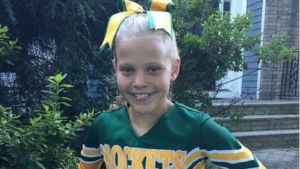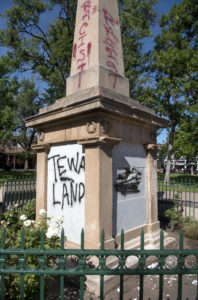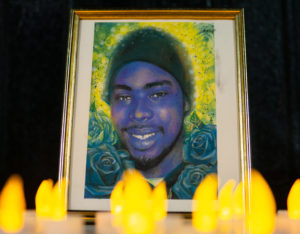751 unmarked graves. That’s the latest discovery at the site of a former residential school for Indigenous children in Canada. Another 215 bodies were found just last month. Native Americans are reeling at the news — and reflecting on what might have happened at Indian boarding schools in the U.S. including one here in Utah.
Jonathan Nez is president of the Navajo Nation, the largest tribe in the United States. KUER’s Pamela McCall spoke with him about these discoveries, and about the Department of the Interior’s plan to investigate the Indian boarding school system in the United States.
Pamela McCall: In Canada, and around the world, people are mourning the discovery of the remains of children who attended residential schools. Now we have learned hundreds more unmarked graves have been discovered. How are Native Americans in the United States feeling about these discoveries?
Jonathan Nez: This really brought back a lot of memories during that time. For us in the Southwest, I think we are going to begin to talk about the hardships that many of our people had to go through — some of those mental health and even behavioral health problems coming from the boarding school era.
I hope Secretary of Interior Deb Haaland’s announcement on an initiative to find these graves throughout the country will shed light. And I’m sure with this investigation we’ll see some revealing items that [have] happened here in the United States of America.

PM: Are you expecting atrocities on the scale that they are uncovering in Canada to be discovered here?
JN: There [in Canada] there are going to be unmarked graves that are going to be excavated. We’ve heard stories here on the Navajo Nation where kids ran away from the boarding school and never returned. So there’s no graves for them. How do we identify where these individuals perished? So that’s something that’s unique for the tribes in the Southwest.
I truly believe there needs to be a larger discussion about the discrimination and racism toward Native Americans. Like I’ve said all along, 30-40% of our Navajo people don’t have running water, and that’s happening in the most powerful country in the world. That’s unacceptable. So I just hope that this initiative and the report that gets developed doesn’t just get shelved. We need to address the needs of our Native American people throughout this country. I’m hopeful that it’s going to begin a bigger discussion.
PM: President Nez, The Church of Jesus Christ of Latter-day Saints ran what they called the Indian Placement Program from 1947 to 2000. Navajo children were put in the homes of Church members. Will foster home type care be part of the investigation? Is that part of all this?
JN: That is not up to me. That is up to the Interior Secretary. But you bring up a good point. Everything should be on the table here rather than just focusing on unmarked graves. Don’t get me wrong, our thoughts and prayers go out to those families., but we also need to step back and look at the bigger picture here of how Native American children were educated and were discriminated upon and taken advantage of.
There are many incidents. There’s even stories of Native American children when they were born —stolen from the hospital and taken elsewhere. Those also need to be brought to the forefront so that this country can deal with some of the traumas because of what we’ve gone through. I know we’re having a discussion right now about our brothers and sisters in the African-American community. Now’s the time to also elevate the conditions and the treatment of Indigenous peoples in this country.
PM: Overall President Nez, what does accountability look like to you?
JN: That is a very good question. There are Navajo people, there are Indigenous people that will never forgive what they’ve gone through. But there also needs to be a larger — again — a larger discussion about this so that those that went through some trauma have an opportunity to talk about it. When you talk about it, that’s a part of healing.
Today, we’ve been fighting the federal government for dollars to support the sovereignty of tribes. The health care system has been underfunded since the start of the Indian Health Services. Same thing with education. Now, if there is some sort of — if you want to call it restitution — I mean, a lot of these programs should be fully funded. And to also place these types of stories into the textbooks of all schools throughout the country so that people know what Indigenous people have gone through. So this has to elevate to a bigger discussion about moving forward as a country and as a nation.
If we pride ourselves on diversity in this country and we embrace the melting pot, then let’s tell the truth about our history here in the United States of America rather than sweeping it under the carpet.
PM: President Nez, I thank you so very much for taking time with us today.
JN: Thank you for having me.




